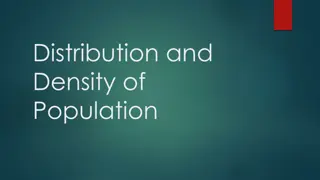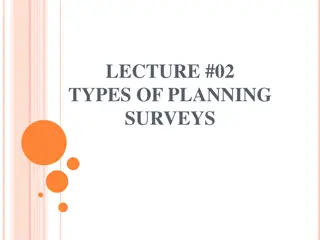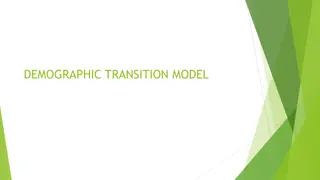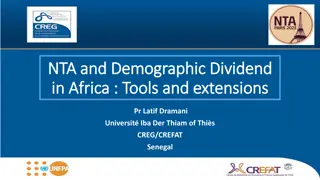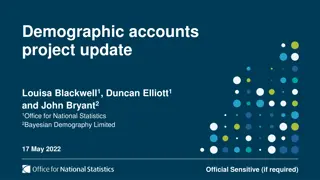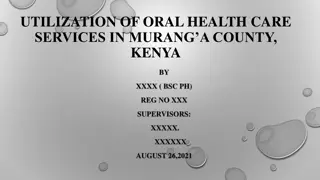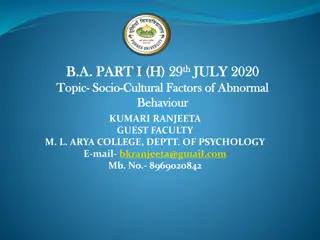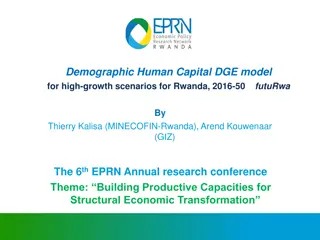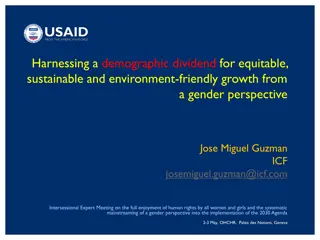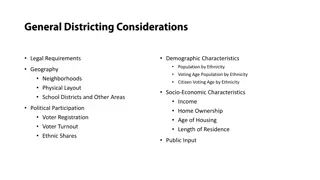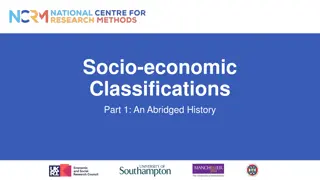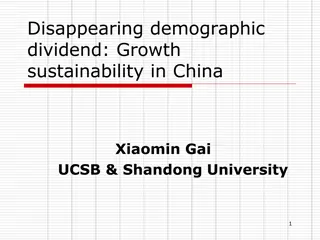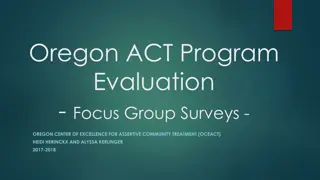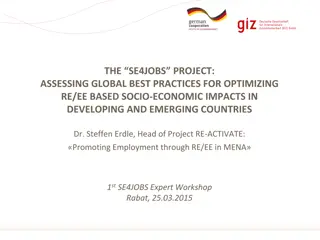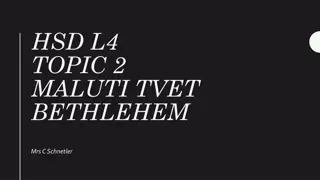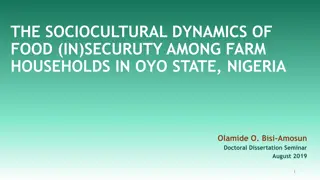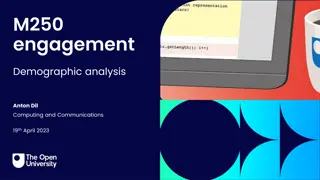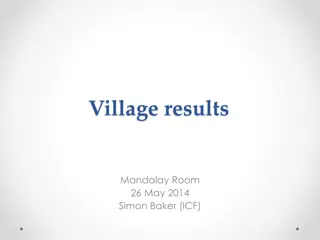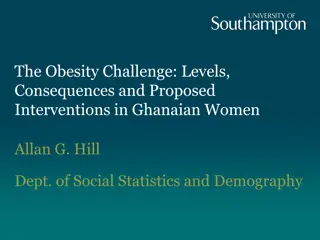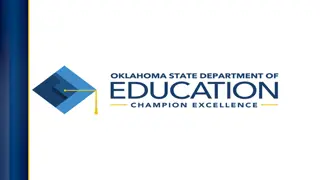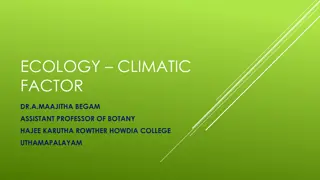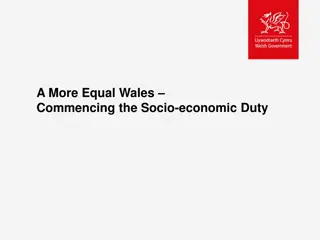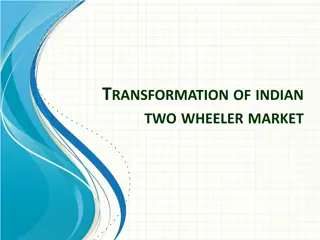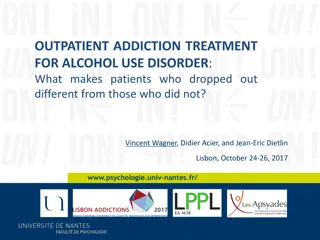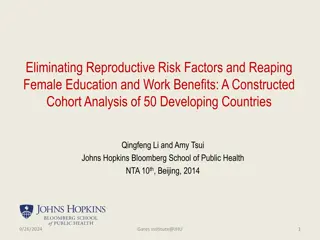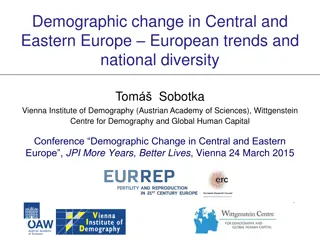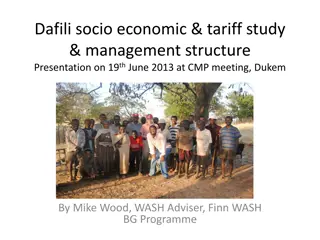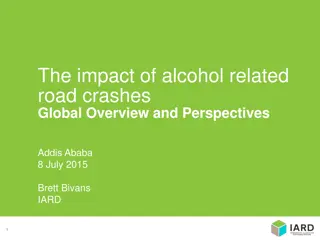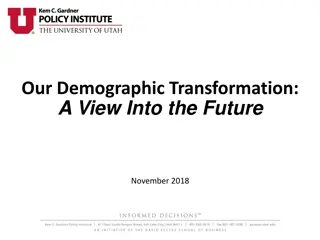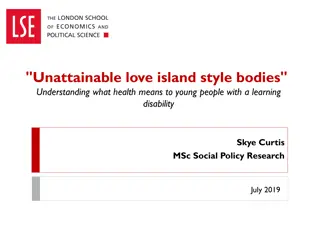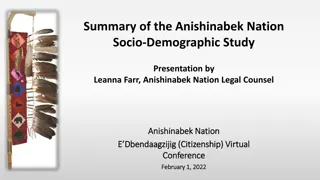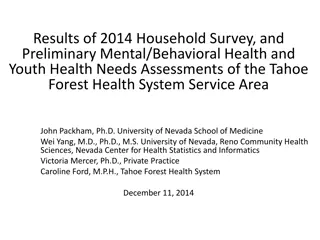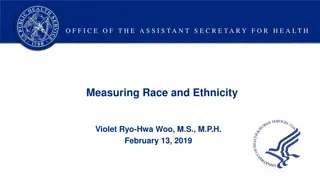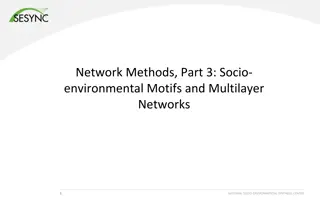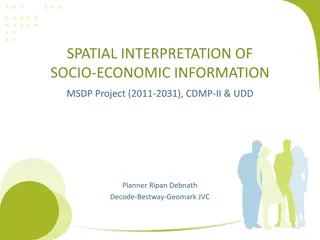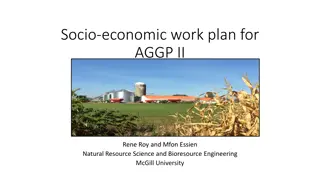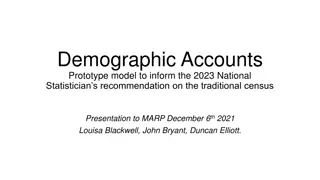Understanding Sustainable Business Models in the Context of Open Data and Socio-Economic Perspectives
Explore the intricate interplay between sustainable business models, open data practices, and socio-economic perspectives presented by Andrew Coote. Delve into the impacts, assessment methods, and the importance of data accessibility in decision-making. Gain insights into the FAIR principles and the
1 views • 16 slides
Understanding the Purpose and Origin of YESAA Legislation
YESAA, the Yukon Environmental and Socio-economic Assessment Act, was developed in collaboration with Yukon First Nations to ensure environmentally and socially responsible project assessments. The Act, passed in 2003, aims to protect environmental quality, heritage resources, and the well-being of
3 views • 19 slides
Distribution and Density of Population.
Population distribution and density are closely related concepts that describe the spatial patterns and proportional relationships of human populations across the world. Factors such as physical landscapes, socio-cultural influences, and demographic trends contribute to the regional disparities in p
8 views • 9 slides
Types of Planning Surveys for Urban Development
Planning surveys play a crucial role in urban development by categorizing various types of surveys like Land Use, Housing, Socio-economic, and Transportation surveys. Each survey type serves a specific purpose, such as determining land allocation, studying housing conditions, assessing socio-economi
1 views • 17 slides
Understanding the Demographic Transition Model
The Demographic Transition Model describes the shift from high birth and death rates to low rates as societies advance technologically and economically. It consists of four stages, each marked by specific characteristics and factors influencing population growth. From high mortality and fertility ra
3 views • 12 slides
Tools and Extensions for NTA and Demographic Dividend in Africa
This content discusses the tools and extensions related to National Transfer Accounts (NTA) and Demographic Dividend in Africa, focusing on quantifying domestic production, consumption, and progress in harnessing demographic dividend. It includes NTA profiles for African countries, NTTA profiles for
2 views • 10 slides
Progress Update on Demographic Accounts Project for June 2022 Delivery
The update covers the progress of the Demographic Accounts project, including proof-of-concept milestones, annual local authority level estimations, model approaches, and data preprocessing. The project aims to deliver demographic accounts by age, sex, and local authority, incorporating data from va
0 views • 15 slides
Factors Influencing Oral Health Care Services Utilization in Murang'a County, Kenya
The study focuses on the utilization of oral health care services in Murang'a County, Kenya. It highlights the burden of oral diseases, factors influencing utilization, research questions, hypothesis, and objectives. The study aims to determine the level of utilization and factors such as socio-demo
0 views • 21 slides
Understanding Socio-Cultural Factors of Abnormal Behavior in Psychology
Exploring the impact of socio-cultural factors on abnormal behavior, this article delves into the influence of societal pressures, cultural norms, and economic status on mental health. The socio-cultural model emphasizes how societal criteria shape perceptions of abnormality, highlighting the role o
0 views • 7 slides
Demographic Human Capital DGE Model for High-Growth Scenarios in Rwanda
This study focuses on a Demographic Human Capital Dynamic General Equilibrium (D-DGE) model for analyzing high-growth scenarios in Rwanda from 2016 to 2050. It explores the interactions of demographic dynamics, human capital, public infrastructure, and debt within a long-term growth framework. The m
0 views • 28 slides
Harnessing a Demographic Dividend for Equitable Growth: A Gender Perspective
Harnessing a demographic dividend involves leveraging a decrease in fertility rates to shift the population towards a larger working-age group, reducing dependency ratios and creating opportunities for economic and social investments. This process requires the right policies and frameworks. The 3 Es
0 views • 11 slides
Comprehensive Community Engagement Strategy for Local Governance
This detailed plan outlines legal requirements, demographic characteristics, socio-economic factors, and political participation in a community. It includes methods such as website updates, mailings, press releases, TV segments, social media engagement, and community meetings to ensure public input
0 views • 11 slides
Evolution of Socio-Economic Classifications: A Historical Overview
Tracing the evolution of socio-economic classifications from Registrar General's Social Class in 1913 to National Statistics Socio-economic Classification in 2020, highlighting key changes and terminologies over the years.
0 views • 6 slides
Challenges and Opportunities in China's Demographic Dividend
China's rapid economic growth was fueled by its demographic dividend, but it now faces challenges such as population aging, rising labor costs, and avoiding the middle-income trap. The country has transitioned to a "new normal" of slower growth, structural changes, and evolving growth drivers. Under
0 views • 63 slides
Demographic Comparison for Representativeness in Oregon ACT Program Evaluation Focus Groups
The study evaluates the representativeness of focus group samples in the Oregon ACT Program. It compares demographic characteristics such as age, gender, race/ethnicity, medication use, and days homeless between the entire ACT population and focus group participants. The findings show differences in
0 views • 28 slides
Global Best Practices for Optimizing RE/EE Socio-Economic Impacts
The SE4JOBS Project aims to identify and analyze global best practices in optimizing socio-economic impacts through RE/EE deployment in developing and emerging countries. By examining key variables and causal relationships, the project seeks to inspire policy debates and decision-making processes to
0 views • 10 slides
Understanding Socio-Affective Development in Infants and Children
Socio-affective development focuses on how individuals interact with others and manage their emotions. It is influenced by factors such as personalities, morality, emotions, and spirituality. Attachment theory, proposed by John Bowlby, explains how infants form relationships with caregivers, startin
0 views • 16 slides
Sociocultural Dynamics of Food (In)security Among Farm Households in Oyo State, Nigeria
This doctoral dissertation seminar explores the sociocultural dynamics of food security among farm households in Oyo State, Nigeria. It delves into demographic characteristics, food production and consumption patterns, socio-cultural drivers of behaviors, and factors influencing food security. The s
0 views • 33 slides
Demographic Analysis and Changes in M250 Module Engagement
The M250 module underwent significant changes in 2021, introducing a new curriculum with practical activities and automated feedback features. The demographic analysis revealed a majority of students aged 25-34, with completion rates varying across different demographic groups. Overall, students fou
0 views • 28 slides
Socio-economic Data Analysis of Selected Villages in Mandalay
This report presents detailed socio-economic data from selected villages in Mandalay, including information on ethnicity, religion, socio-economic background, availability of electricity, civil society groups and activities, source of credit, and water sources. The data provides insights into the de
0 views • 8 slides
Obesity Challenge in Ghanaian Women: Levels, Consequences & Interventions
The study explores obesity levels in Ghanaian women, highlighting correlations with socio-demographic factors such as age, wealth index, education, and urban/rural residence. The research indicates high rates of obesity alongside childhood under-nutrition in lower-income settings. Proposed intervent
0 views • 24 slides
Understanding Demographic Overlay Reports for Education Accountability
Demographic Overlay Reports play a crucial role in education accountability by certifying student demographics for assessment purposes. This report, sourced from district Student Information Systems (SIS), requires careful review to ensure accurate data transmission to the assessment platform. Any d
0 views • 15 slides
Ecological Factors and Climatic Influences on Plant Life
Ecological factors play a crucial role in shaping the environment for organisms to thrive. This includes living (biotic) and non-living (abiotic) components like climatic factors, edaphic factors, topographic factors, and biotic factors. Climatic factors such as light, temperature, water, wind, and
0 views • 14 slides
Promoting Equality in Wales: Implementing the Socio-economic Duty
The Welsh Government is prioritizing equality and human rights, especially in the context of Brexit, by commencing the socio-economic duty outlined in the Wales Act 2017. This duty requires specified public bodies to consider how their decisions can reduce inequalities associated with socio-economic
0 views • 13 slides
Transformation of Indian Two-Wheeler Market: Factors and Impacts
The Indian two-wheeler market has undergone significant transformation driven by factors like demographic changes, regulatory policies, technological advancements, and socio-cultural shifts. These changes have impacted the industry by influencing consumer demand, market segmentation, and competitive
0 views • 7 slides
Factors Influencing Dropout in Outpatient Alcohol Addiction Treatment
This study investigates the reasons behind patient dropouts in outpatient alcohol addiction treatment programs. It focuses on various factors such as socio-demographic characteristics, alcohol- and treatment-related variables, health-related quality of life, and cognitive impairments. The research i
0 views • 18 slides
Impact of Reproductive Risk Factors on Female Education and Work Outcomes in Developing Countries
This analysis examines the effects of reproductive risk factors on the health, education, and work outcomes of daughters in developing countries. By eliminating these risks, the study aims to simulate improvements in female education and workforce participation, contributing to demographic dividend
0 views • 23 slides
Demographic Shifts in Central and Eastern Europe Post-1989: A Closer Look
The collapse of state socialism in Central and Eastern Europe in 1989-91 brought about significant changes, leading to economic and social transformations. The region experienced new political and economic freedoms, although inequalities grew. Unique demographic divides between East and West Europe
0 views • 43 slides
Dafili Socio-Economic & Tariff Study Presentation Summary
Presentation delivered by Mike Wood at a CMP meeting in Dukem on June 19, 2013, focused on a socio-economic and tariff study for the Dafili community. The study aimed to gather demographic data, assess the community's ability and willingness to pay for water, recommend affordable tariffs, and evalua
0 views • 29 slides
Global Impact of Alcohol-Related Road Crashes
Road traffic crashes pose a significant global health concern, resulting in 1.2 million deaths annually with 20-50 million injuries. Alcohol plays a major role in fatal crashes, affecting 33%-69% in low and middle-income countries. The economic cost is estimated at $518 billion yearly, with demograp
0 views • 13 slides
Demographic Trends and Future Projections: A Comprehensive Analysis
Explore the demographic transformation from past to future, including population growth rates, urbanization trends, and county-level projections in Utah. Learn about the impact of migration on population change and key factors influencing demographic shifts. Data sources include the Bureau of the Ce
0 views • 50 slides
Understanding Health Perceptions of Young People with Learning Disabilities
This research delves into how young individuals with learning disabilities perceive health, exploring the concepts of physical, mental well-being, and the impact of socio-economic factors on health outcomes. Through interviews and focus groups, the study reveals diverse perspectives on health behavi
0 views • 12 slides
Insights from Anishinabek Nation Socio-Demographic Study Presentation
An overview of the Anishinabek Nation Socio-Demographic Study presented by Leanna Farr focused on various factors such as language usage, population trends, legislative impacts, and projections related to the Registered Indian population growth. The study highlights demographic shifts, language patt
0 views • 16 slides
2014 Household Survey & Health Needs Assessment in Tahoe Forest Health System Service Area
The 2014 Household Survey and Preliminary Mental/Behavioral Health & Youth Health Needs Assessments were conducted in the Tahoe Forest Health System Service Area. The surveys gathered data on various socio-demographic factors, health statuses, and general well-being perceptions. Results indicate ins
0 views • 147 slides
Importance of Measuring Race and Ethnicity in Health Disparities
This presentation discusses the significance of measuring race and ethnicity in addressing health disparities, underlining the impact of social, economic, and environmental factors on various demographic groups. It covers federal data collection guidelines, best practices, and the use of demographic
0 views • 14 slides
Exploring Socio-Environmental Motifs and Multilayer Networks
The content delves into socio-environmental motifs, anti-motifs, and multi-plex networks in the context of national socio-environmental synthesis centers. It uncovers the least likely and common occurrences in random networks, as well as common subnetworks underrepresented in the model of inquiry. T
0 views • 7 slides
Spatial Interpretation of Socio-Economic Information in Urban Area
The project focuses on analyzing socio-economic data in Mymensingh Municipality from 2011 to 2031. It includes field verification findings, spatial interpretation results, maps/figures representing family and settlement types, and considerations for urban planning. The presentation outlines basic in
0 views • 35 slides
Cross-National & Cross-Cultural Risk Factors for Offending
Explore key risk factors for offending across nations & cultures, analyzing homicide rates, structural differences, individual/family factors, and the generalizability of crime risk factors. Learn about findings related to impulsivity, achievement, conduct problems, family supervision, parenting sty
0 views • 13 slides
Sustainable Agricultural Practices and Technology Transfer Plan
The Socio-Economic Work Plan for AGGP II focuses on the partial budgeting of beneficial management practices related to water management systems, GHG mitigation, and adaptation. It aims to identify co-benefits, assess socio-economic factors affecting water demand and climate change, develop a region
0 views • 19 slides
Enhancing Demographic Accounts for Informed Decision-Making
The presentation discusses the prototype model for demographic accounts to inform the 2023 National Statistician's recommendation on the traditional census. It delves into the limitations of the current system, the structure of demographic accounts, advantages and disadvantages, exploratory analysis
0 views • 29 slides


